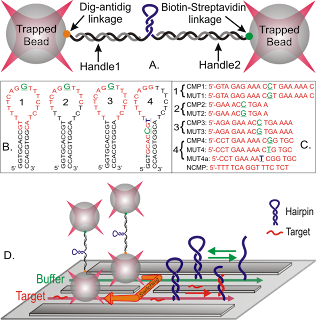Scientists in the Department of Chemistry, Kent State University have introduced a new novel method to detect Single Nucleotide Polymorphism (SNP) using laser tweezers in microfluidic platform. This work has been published in Journal of the American chemical society (JACS), a leading journal in Chemistry.
SNP is the most common variation in the genomic DNA sequence between members of the same species by one nucleotide. This is caused by various factors. Studies have revealed that they are distributed throughout the human genome by an estimated average of 1 per 1000 base pairs. SNPs are attributed to be closely linked with gene function, genetic variations between individuals, variety of diseases and susceptibilities of humans to the pathogens. Usually SNP is not associated with any disease but it might cause variation in response for the disease, toxins, bacteria, drugs etc. They may be used as bio-markers for disease genes. And, it definitely requires reliable method.
SNPs can be detected by several methods such as molecular beacons, gene sequenceing or some other analytical tools that can detect the difference in effect of a single nucleotide in base pairing with the complementary DNA. The novel idea in the above mentioned publication is the incorporation of the mechanical differentiation of the base pairing event with the microfluidics platform and is expected to be useful in the development of generic biosensors. Laser tweezer was used to monitor the binding of the target DNA sequences with the probe molecule, a DNA hairpin. Binding of the target with the hairpin DNA tied to the tweezers caused hairpin molecule in the unfolded (off) state instead of the stochastic hopping between folded(on ) and unfolded (off) states. Authors had claimed that this method has less background signal compared to fluorescence based technique and easier compared to the PCR based amplification and sequencing techniques. This method has been sensitive enough to detect 100 pM SNP associated with the coronary heart disease.
According to Deepak Koirala, chemistry graduate student and main author of the article who came from Nepal, this innovation is in the process of getting US patent.









No comments:
Post a Comment